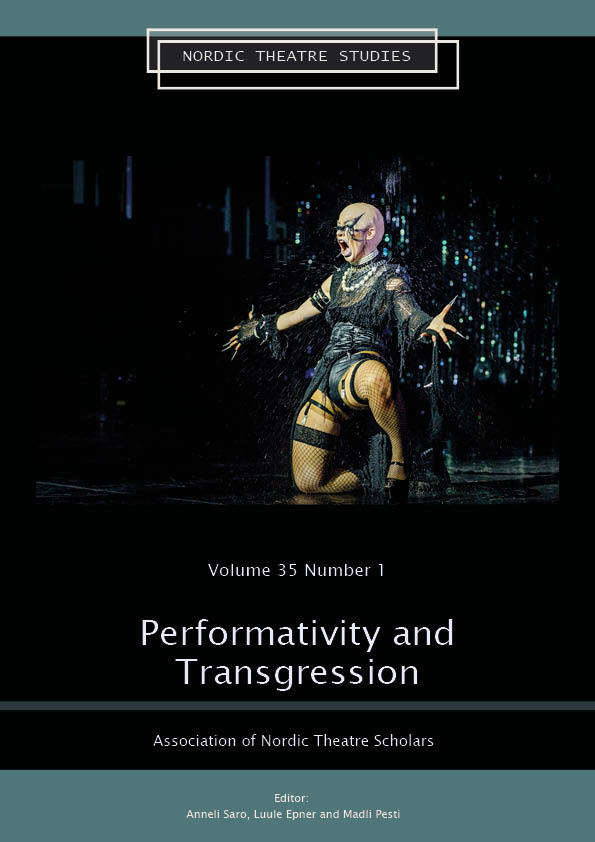Sexuality and the Transgression of Gaze in the Theatre
DOI:
https://doi.org/10.7146/nts.v35i1.145370Keywords:
gaze, soft transgression, sexuality, new sensibilities, Estonian theatreAbstract
In the twenty-first century, the most common cases of transgression in theatre are related either to breaking certain religious or social norms, particularly when combined with indecent language and exposure of the body. Nevertheless, this article investigates something as essential as viewing relying on the notion “gaze” and “soft transgression” (Patrice Pavis).
First, the article explores different theoretical approaches to viewing, especially the ones relevant in the context of performing arts and gender identity, and highlights some phenomenological aspects of bidirectional theatrical gaze. A theoretical framework is constructed for the analysis of a production, which dealt predominantly with female representations and which was interpreted as transgressive – 72 Days (2022, Estonian Academy of Music and Theatre) by Ene-Liis Semper, Tiit Ojasoo and Giacomo Veronesi. The analysis is divided into three parts: transgression of gaze, transgression by mouth and sexualizing gaze. The main conclusions of the analysis are supported by a comparable example from Lithuania – Sleepers (2021, Lithuanian National Drama Theatre) by Oskaras Koršunovas.
Based on the case studies, one can conclude that in the current regime of new sensitivities, critical audiences have become more sensitive about artistically unjustified exposure of naked or sexualized bodies on stage. With the notion “new sensitivities” I refer to a trend in the twenty-first century where receivers find certain representational traditions unacceptable, which has led to different forms of censorship.
References
päeva. Eesti Muusika- ja Teatriakadeemia. https://eamt.ee/uritused/72-paeva-5/ (12.9.2022).
“About us.” Femen official blog. https://femen.org/about-us/ (10.3.2023).
Bal, Mieke. 2001. Looking in the Art of Viewing. London and New York: Routledge.
Bataille, Georges. 2001. Eroticism. London: Penguin.
Bly, Nellie. 1890. Nellie Bly’s Book: Around the World in Seventy-two Days. New York: The Pictorial Weeklies Company.
Bryson, Norman. 2001. “Introduction: Art and Intersubjectivity.” In Mieke Bal and Norman Bryson (eds.). Looking in the Art of Viewing. London and New York: Routledge, 1–39.
Dolan, Jill. 2010. Theatre & sexuality. Basingstoke, New York: Palgrave Macmillan.
Epner, Eero. 2022. ”Jaak Kangilaski (10. XII 1939 – 30. VIII 2022) in memoriam.” Eesti Ekspress, 7.9.2022.
“Gaze.” Cambridge Dictionary. https://dictionary.cambridge.org/dictionary/english/gaze (5.12.2023).
“Gaze.” Merriam-Webster Dictionary, https://www.merriam-webster.com/dictionary/gaze (5.12.2023).
Giesen, Bernhard. 2015. “Inbetweenness and Ambivalence.” In Agnes Horvath, Bjørn Thomassen, Harald Wydra (eds.). Breaking Boundaries. Varieties of Liminality. New York and Oxford: Berthahn, 61–71.
Hietanen, Jari. 2018. “Affective eye contact: An integrative review.” Frontiers in Psychology 9, https://doi.org/10.3389/fpsyg.2018.01587.
Karnau, Andrus. 2022. ”Kuue päevaga läbi ja ümber Eesti.” Sirp, 23.9.2022, 28–9.
“Korrakaitseseadus.” Riigi Teataja, 23.3.2015. https://www.riigiteataja.ee/akt/123032015207 (5.12.2023).
Lauretis, Teresa de. 1983. Alice Doesn’t: Feminism, Semiotics, Cinema. London: McMillan.
Mulvey, Laura. 1975. “Visual Pleasure and Narrative Cinema.” Screen Volume 16, Issue 3, Autumn 1975, 6–18, https://doi.org/10.1093/screen/16.3.6.
Oidsalu, Meelis. 2022. ”Reportaaž poolerootiliselt õnnetuspaigalt.” Postimees, 21.2.2022.
Ojasoo, Tiit. Email to Anneli Saro, 24.2.2023. The private archive of Anneli Saro.
Pavis, Patrice. 2020. “Transgression.” In Patrice Pavice. The Routledge Dictionary of Performance and Contemporary Theatre. London and New York: Routledge, 265–6.
Ramos-Gay, Ignacio. 2018. “Female Nudity, Interspecies Sexuality and ‘Horseness’ in Laetitia Dosch’s Hate.” Theatre Research International 47:2, 160–81, doi: 10.1017/S0307883322000062.
Schilbach, Leonhard. 2015. “Eye to eye, face to face and brain to brain: Novel approaches to study the behavioral dynamics and neural mechanisms of social interaction.” Current Opinion in Behavioral Sciences 3, 130–5, https://doi.org/10.1016/j.cobeha. 2015.03.006.
Semper, Ene-Liis and Tiit Ojasoo, public post-performance interview after 72 days. Interviewed by Raili Marling. Festival Draama 2022, Estonian National Museum, 8.9.2022.
Silverman, Kaja. 1989. “Fassbinder and Lacan: A Reconsideration of Gaze, Look and Image.” Camera Obscura 19, 54–84.
“Teatriankeet hooajast 2021/22.” Teater. Muusika. Kino. December 2022, 25–60.
To be or not to be in Russia, a huge dilemma for Lithuanian artists – interview. LRT.lt 12.3.2022. https://www.lrt.lt/en/news-in-english/19/1639675/to-be-or-not-to-be-in-russia-a-huge-dilemma-for-lithuanian-artists-interview (5.12.2023).
Toome, Hedi-Liis. 2022. “Kaip teatras atspindi tikrovę: kai kurie moterų vaizdavimo aspektai spektaklyje “Miegantys”.” Menų faktūrą, 23.12.2022, https://menufaktura.lt/?m=1052&s=71076 (8.2.2023).
Veelmaa, Tõnis. 2022. “Performance analysis. Alice Siil in 72 days.” Unpublished essay. University of Tartu.
Willson, Jacki. 2015. Being Gorgeous. Feminism, Sexuality and the Pleasures of Visual. London and New York: I.B. Tauris.
Downloads
Published
How to Cite
Issue
Section
License
The copyright belongs to the authors and Nordic Theatre Studies. Users can use, reuse and build upon the material published in the journal but only for non-commercial purposes. Users are allowed to link to the files, download the files, distribute the files on a local network (preferably by links), upload the files to local repositories if their institutions require them to do so, but not republish the files without proper agreements with the journal and the author.

